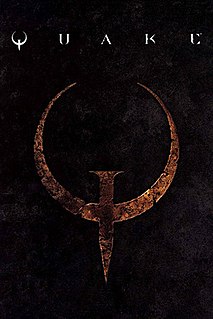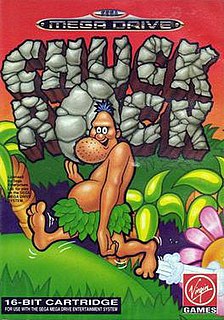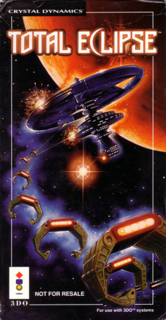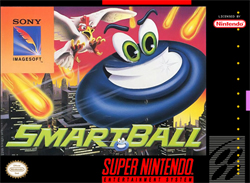
Quake is a first-person shooter game developed by id Software and published by GT Interactive. The first game in the Quake series, it was originally released for MS-DOS, Microsoft Windows and Linux in 1996, followed by Mac OS and Sega Saturn in 1997 and Nintendo 64 in 1998. In the game, players must find their way through various maze-like, medieval environments while battling monsters using an array of weaponry. The overall atmosphere is dark and gritty, with many stone textures and a rusty, capitalized font. Quake takes heavy inspiration from gothic fiction and the works of H. P. Lovecraft.
Video game development is the process of developing a video game. The effort is undertaken by a developer, ranging from a single person to an international team dispersed across the globe. Development of traditional commercial PC and console games is normally funded by a publisher, and can take several years to reach completion. Indie games usually take less time and money and can be produced by individuals and smaller developers. The independent game industry has been on the rise, facilitated by the growth of accessible game development software such as Unity platform and Unreal Engine and new online distribution systems such as Steam and Uplay, as well as the mobile game market for Android and iOS devices.

Tempest is a 1981 arcade game by Atari Inc., designed and programmed by Dave Theurer. It takes place on a three-dimensional surface divided into lanes, sometimes as a closed tube, and viewed from one end. The player controls a claw-shaped "blaster" that sits on the edge of the surface, snapping from segment to segment as a rotary knob is turned.

Robotron: 2084 is a multidirectional shooter developed by Eugene Jarvis and Larry DeMar of Vid Kidz and released in arcades by Williams Electronics in 1982. The game is set in the year 2084 in a fictional world where robots have turned against humans in a cybernetic revolt. The aim is to defeat endless waves of robots, rescue surviving humans, and earn as many points as possible.

Road Rash is a motorcycle racing video game series by Electronic Arts in which the player participates in violent, illegal street races. The series started on the Sega Genesis/Mega Drive and was released on various other systems over the years. The game's title is based on the slang term for the severe friction burns that can occur in a motorcycle fall where skin comes into contact with the ground at high speed.
Free Fall Associates was a video game developer of the 1980s and early 1990s founded in 1981 by game designer Jon Freeman, game programmer Anne Westfall, and game designer Paul Reiche III. Westfall and Freeman are married. To start the new company, Freeman and Westfall left Epyx, the company Freeman co-founded in 1978. Free Fall Associates is best known for Archon: The Light and the Dark (1983), which was one of the first games from new publisher Electronic Arts.

Repton is a computer game originally developed by 16-year-old Briton Tim Tyler for the BBC Micro and Acorn Electron and released by Superior Software in 1985. The game spawned a series of follow up games which were released throughout the 1980s. The series sold around 125,000 copies between 1985 and 1990 with Repton 2 selling 35,000 itself. The games have since been remade for several modern systems, including iRepton for the iPhone / iPod Touch in 2010, and Android Repton 1, Android Repton 2 and Android Repton 3 from 2016 to 2018.

The Faery Tale Adventure is a 1987 action role-playing video game designed by David Joiner and published by MicroIllusions for the Amiga, and later ported to the Commodore 64, MS-DOS, and Sega Genesis. The MS-DOS version is titled The Faery Tale Adventure: Book I. Microillusions also released a "Book 1" version for the Amiga which was going to be the start of a series of games, according to Talin, but bankruptcy prevented it. The initial version was produced for the Amiga 1000 and featured the largest game world to that date. A sequel, Halls of the Dead: Faery Tale Adventure II, was released in 1997.

Chuck Rock is a 1991 slapstick side-scrolling platform video game developed and published by Core Design for the Atari ST and Amiga computers. A Commodore 64 port followed in 1992 and an Amiga CD32 version in 1994. The game was subsequently published by Krisalis Software for the Acorn Archimedes. Virgin Interactive published the game for the Sega Mega Drive/Genesis, Master System, and the Game Gear. Sony Imagesoft published the game for the Sega Mega-CD, Super NES, and Game Boy.

Captain America and the Avengers is a beat 'em up arcade game developed and released by Data East in 1991. It features the Avengers team of Marvel Comics characters in a side-scrolling brawling and shooting adventure to defeat the evil Red Skull. The game received ports for the Sega Genesis/Mega Drive, Super Nintendo Entertainment System, Game Boy and Game Gear. A different Data East game was released for the Nintendo Entertainment System.

Leander is a video game for the Amiga developed by Traveller's Tales and published by Psygnosis in 1991. It was the first game developed by Traveller's Tales. The game was developed on the Amiga, then converted to the Atari ST by Philipp Wyatt for W.J.S Design. A year later it was published for the Sega Genesis as Galahad by Electronic Arts.

Corporation is a video game for Amiga, Atari ST and MS-DOS, later ported to the Mega Drive/Genesis. It was developed for Core Design by Dimension Creative Designs by Bill Allen with graphics and design by Kevin Bulmer.

Kobolds Ate My Baby! is an independently published role-playing game from 9th Level Games, a small-press publisher and designer of humorous role-playing games (RPGs) based in Pennsylvania. The name is a derivative reference to the Azaria Chamberlain disappearance and the famous misquote, "A dingo ate my baby!" The Super Deluxx Edition was still designed by 9th Level Games but is published by Dork Storm Press.

Pac-Mania is an isometric maze game that was developed and released by Namco for arcades in 1987. In the game, the player controls Pac-Man as he must eat all of the dots while avoiding the colored ghosts that chase him in the maze. Eating large flashing "Power Pellets" will allow Pac-Man to eat the ghosts for bonus points, which lasts for a short period of time. A new feature to this game allows Pac-Man to jump over the ghosts to evade capture. It is the ninth title in the Pac-Man video game series and was the last one developed for arcades up until the release of Pac-Man Arrangement in 1996. Development was directed by Pac-Man creator Toru Iwatani. It was licensed to Atari Games for release in North America.

Zoo Tycoon is a series of business simulation video games. The worlds focus around building and running successful zoo scenarios. The series was initially developed by Blue Fang Games and published by Microsoft Studios who later in 2001-2008 went on to create two stand-alone video games and seven expansion packs for PC and Macintosh platforms. In 2013, Microsoft Studios released a new Zoo Tycoon game, developed by Frontier Developments for Xbox One and Xbox 360. An enhanced version of the Xbox game, Zoo Tycoon: Ultimate Animal Collection, was released for Windows 10 and the Xbox One on October 31, 2017. Frontier Developments, the developer of the final Zoo Tycoon game, released the spiritual successor to the series, Planet Zoo, in 2019.

Total Eclipse is a space flight simulation video game developed and published by Crystal Dynamics for 3DO. It was later ported to the PlayStation under the title Total Eclipse Turbo. The game was copyrighted in 1993 but not made available to the public until 1994, leading some sources to mistakenly list its release date as 1993. A sequel, Solar Eclipse, was released for Sega Saturn and PlayStation.
There have been a variety of Sesame Street video games released for video game platforms. Most of the Sesame Street video games were published and developed by NewKidCo.

Smart Ball is a platform game developed by Game Freak and System Sacom. It was published by Epic/Sony Records and Sony Imagesoft for the Super Nintendo Entertainment System in 1991. A sequel titled Jerry Boy 2 was in production, but was not released.

Disney's Tarzan is a platform game developed by Eurocom and published by Sony Computer Entertainment for the PlayStation in 1999. It is based on the Disney animated film Tarzan from the same year. Versions were released for Microsoft Windows in 1999 and for the Nintendo 64 in 2000. A variant of the game for the Game Boy Color was developed by Digital Eclipse and released in 1999.
EPOC is a mobile operating system developed by Psion, a British company founded in 1980. It began as a 16-bit operating system (OS) for Psion's own x86-compatible devices, and was later replaced by a 32-bit system for x86 and ARM. Psion licensed the 32-bit system to other hardware makers, such as Ericsson.
















